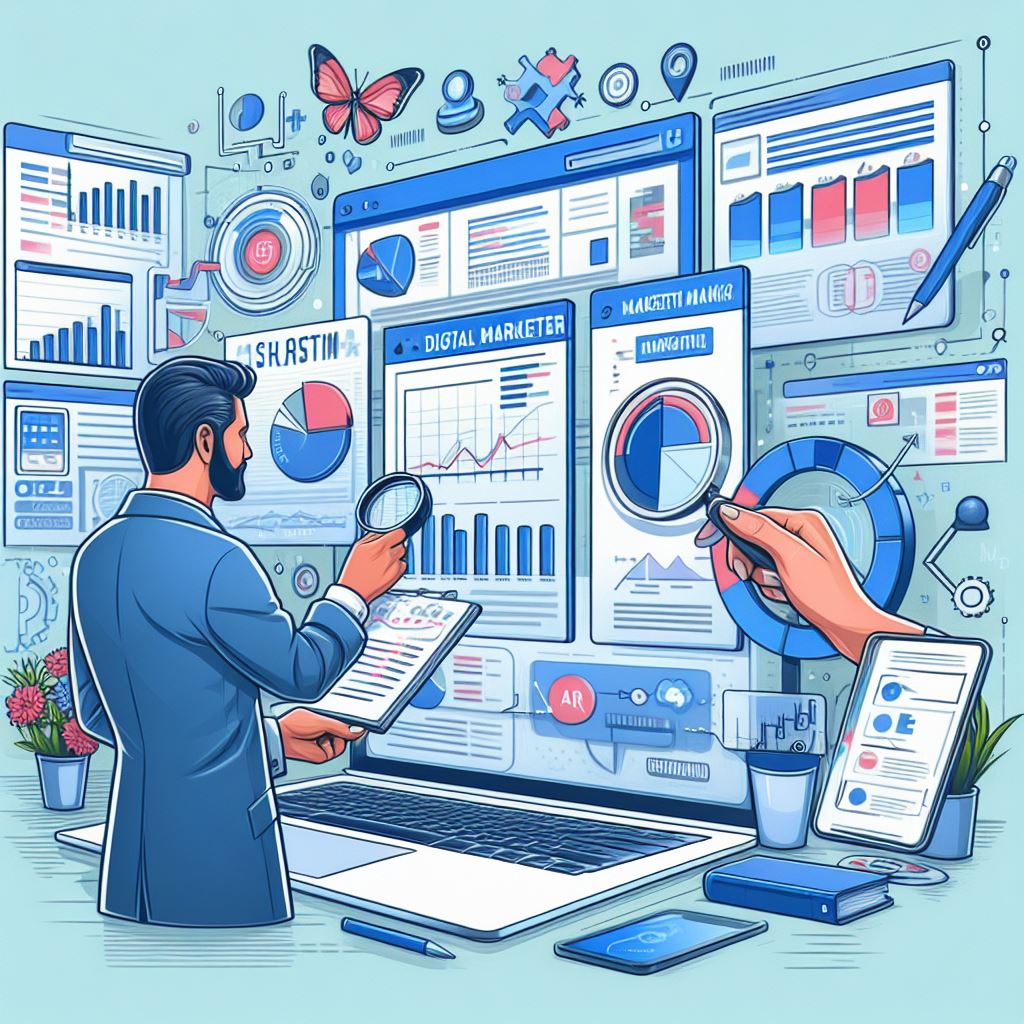Introduction:
Digital marketing has become an integral part of today’s business world, companies leveraging online platforms to reach their target audience effectively. As a result, there is an increasing demand for talented digital marketing professionals who can navigate the evolving landscape of this industry. In this comprehensive guide, we will explore the various digital marketing jobs, industries that utilize digital marketing, the job market trends, and essential steps to pursue a successful career in this field.
I. Understanding Digital Marketing Jobs

A. Digital Marketing Roles and Responsibilities
-
Digital Marketing Manager
A digital marketing manager is responsible for developing and implementing online marketing strategies. They oversee the planning, execution, and tracking of all digital marketing campaigns. Their role involves analyzing market trends, identifying target audiences, and ensuring that the brand’s online presence is optimized. -
Social Media Specialist
Social media specialists are experts in creating engaging content for social media platforms. They manage the brand’s social media accounts, engage with the audience, monitor trends, and measure the effectiveness of social media campaigns. Their goal is to build brand awareness, generate leads, and drive website traffic through social media platforms. -
SEO Specialist
SEO specialists focus on improving a website’s visibility in search engine results. They conduct keyword research, optimize website content, and implement strategies to improve a website’s ranking. Their expertise lies in understanding search engine algorithms and utilizing both on-page and off-page SEO techniques.
B. Essential Skills for Digital Marketers
-
Marketing Strategy and Analytics
Digital marketers need a solid understanding of marketing principles and strategies. They should be able to analyze data, identify trends, and make data-driven decisions. Tools like Google Analytics can help digital marketers gain insights into website traffic, audience demographics, and campaign performance. -
Content Creation and Copywriting
High-quality content is key to engaging and attracting online audiences. Digital marketers should possess exceptional writing skills and be able to create compelling content for various online platforms. They should understand the art of storytelling and be able to craft messages that resonate with their target audience. -
Basic Design Skills
While not necessary to be a design expert, digital marketers should have a basic understanding of design principles. This knowledge helps in creating visually appealing graphics, videos, and other visual content for social media platforms, websites, and email campaigns.
II. Industries and Sectors Utilizing Digital Marketing

A. E-commerce and Retail
- Effective strategies for online sales
In the e-commerce and retail industry, digital marketing plays a crucial role in driving online sales. Strategies like search engine optimization (SEO), pay-per-click (PPC) advertising, email marketing, and social media advertising help businesses reach wider audiences and increase conversions. - The role of digital marketing in customer engagement
Digital marketing allows retailers to build strong relationships with their customers. By leveraging data and personalization, brands can deliver relevant content, offers, and recommendations to engage customers throughout their purchase journey. - Leveraging data to enhance user experience
E-commerce businesses have access to vast amounts of data from customer behavior, preferences, and purchase history. By leveraging this data, digital marketers can personalize the user experience, recommend relevant products, and improve overall customer satisfaction.
B. Technology and Software
- Marketing software solutions for tech companies
Digital marketing tools and software enable tech companies to streamline their marketing efforts. These tools include customer relationship management (CRM) systems, marketing automation platforms, and analytics tools that help tech companies track and measure the effectiveness of their digital marketing campaigns. - Digital marketing strategies for software products
Digital marketing plays a vital role in increasing software product awareness and driving downloads or subscriptions. Strategies like content marketing, search engine optimization, and social media advertising help tech companies reach their target audience and convince them to choose their software solution. - Building a strong online presence for tech brands
In the highly competitive technology industry, digital marketing is crucial for building brand credibility and establishing thought leadership. By creating informative blog posts, thought-provoking content, and engaging on social media platforms, tech brands can position themselves as industry leaders.
C. Healthcare and Pharmaceutical
- Digital marketing campaigns for healthcare providers
Healthcare providers utilize digital marketing to raise awareness about their services and target specific patient demographics. They leverage social media, content marketing, and email campaigns to educate patients, provide valuable health information, and establish trust and credibility. - Online reputation management in the healthcare industry
In the healthcare industry, online reputation management is essential. Digital marketers monitor online reviews and ratings, respond to patient feedback, and manage the brand’s reputation on platforms like Google My Business and healthcare-specific review sites. - Compliance and ethical considerations in digital marketing
Digital marketers in the healthcare and pharmaceutical industry must adhere to strict legal and ethical guidelines. They need to ensure compliance with regulations such as HIPAA (Health Insurance Portability and Accountability Act) and maintain confidentiality while implementing digital marketing strategies.
III. Digital Marketing Job Market and Opportunities

A. Job Market Trends
- Rise in remote work opportunities
Digital marketing jobs often offer the flexibility to work remotely. This trend has been further accelerated by the recent shift in work culture due to the global pandemic. Companies are now more open to hiring remote digital marketing professionals, creating more opportunities for those seeking flexible work arrangements. - Increasing demand for specialized skills
As the digital marketing landscape becomes more complex, there is a higher demand for professionals with specialized skills. Companies are seeking experts in areas like data analytics, conversion rate optimization, marketing automation, and social media advertising. - Impact of emerging technologies on job availability
Emerging technologies like artificial intelligence, voice search, and virtual reality are influencing the digital marketing landscape. Job opportunities are arising in these niche areas as businesses strive to stay ahead of the competition and adopt innovative marketing strategies.
B. Career Paths in Digital Marketing
- Agency vs. In-house roles
Digital marketing professionals have the option to work either in marketing agencies or in-house marketing teams. Agencies provide exposure to a diverse range of clients and industries, while in-house roles offer the opportunity to closely align with a specific brand’s strategies and goals. - Advancement opportunities and career growth
Digital marketing offers ample room for career growth. Professionals can advance from entry-level positions to managerial roles by acquiring new skills, demonstrating exceptional performance, and leveraging networking and professional development opportunities. - Combining digital marketing skills with other disciplines
Digital marketing skills complement various other disciplines like graphic design, psychology, or data analysis. Combining these skills can create unique job opportunities and help professionals stand out in the competitive job market.
IV. Essential Steps to Pursue a Digital Marketing Career

A. Education and Training
- Accredited programs and certifications
There are numerous accredited programs and certifications available that provide comprehensive training in digital marketing. These programs cover vital areas like SEO, content marketing, social media, and analytics, equipping individuals with the necessary skills and knowledge to excel in this field. - Online learning platforms and resources
Online learning platforms like Coursera, Udemy, and HubSpot Academy offer a wide range of digital marketing courses. These platforms provide flexibility and affordability, allowing individuals to gain relevant skills at their own pace. - Importance of continuous learning and staying updated
Digital marketing is a rapidly evolving field, and staying updated with the latest trends and practices is crucial. Professionals can join industry associations, attend webinars, and follow industry blogs and podcasts to continuously learn and adapt to the changing digital landscape.
B. Gaining Practical Experience
- Internships and entry-level positions
Securing internships or entry-level positions in digital marketing is an excellent way to gain practical experience and apply theoretical knowledge. These opportunities provide hands-on training, mentorship, and exposure to real-world digital marketing campaigns. - Freelancing and building a portfolio
Freelancing allows individuals to work on diverse projects, build a portfolio, and gain practical experience in various aspects of digital marketing. This experience can be showcased to potential employers or clients to demonstrate skills and expertise. - Networking and attending industry events
Networking is essential in the digital marketing industry. Attending industry conferences, seminars, and networking events provides opportunities to connect with industry professionals, gain insights, and explore potential job or collaboration opportunities.
C. Developing a Strong Digital Presence
- Building personal branding through social media
Digital marketers should leverage their personal social media profiles to showcase their knowledge, creativity, and passion for the field. Engaging with industry influencers, sharing valuable content, and participating in relevant discussions can help establish a solid personal brand. - Showcasing skills and expertise through a professional website
Creating a professional website is an effective way to showcase skills, expertise, and past work. A well-designed website can serve as a portfolio, displaying successful campaigns, blog posts, and testimonials from clients or employers. - Leveraging online communities and industry forums
Joining online communities and industry forums like Reddit or LinkedIn groups allows digital marketers to connect with like-minded professionals, share insights, seek advice, and stay updated with industry news and trends.
V. Summary and FAQs

A. Summary of key points discussed throughout the article
In this comprehensive guide, we explored various digital marketing jobs, industries that utilize digital marketing, the job market trends, and essential steps to pursue a successful career in this field. We delved into the roles and responsibilities of digital marketing professionals, the skills required to excel in the industry, and the different sectors where digital marketing plays a vital role.
B. Frequently Asked Questions (FAQs)
- What are the average salaries in the digital marketing industry?
- Are digital marketing jobs in high demand globally?
- Can I transition to a digital marketing career from a different field?
- What are the future prospects for digital marketing jobs?
- What are some recommended resources to stay updated in the field?
This comprehensive guide to digital marketing jobs provides aspiring professionals with an in-depth understanding of various roles, industries, career paths, and steps to pursue a successful career in the field. It equips readers with valuable insights to navigate the evolving landscape of digital marketing while offering practical advice and essential resources.
B. Frequently Asked Questions (FAQs)
Q: What does this comprehensive guide cover?
A: This guide covers various digital marketing jobs, industries that utilize digital marketing, job market trends, and essential steps to pursue a successful career in this field. It also explores the roles and responsibilities of digital marketing professionals, the skills required to excel in the industry, and the different sectors where digital marketing plays a vital role.
Q: What is the tone of this guide?
A: The tone of this guide is formal, providing a professional and informative perspective on digital marketing jobs.
Q: How long should this guide be?
A: The desired length for this guide is 3-4 sentences, ensuring concise yet comprehensive coverage of the topic.
Q: Which language should be used in this guide?
A: This guide should be written in UK English, adhering to the language conventions of the United Kingdom.


